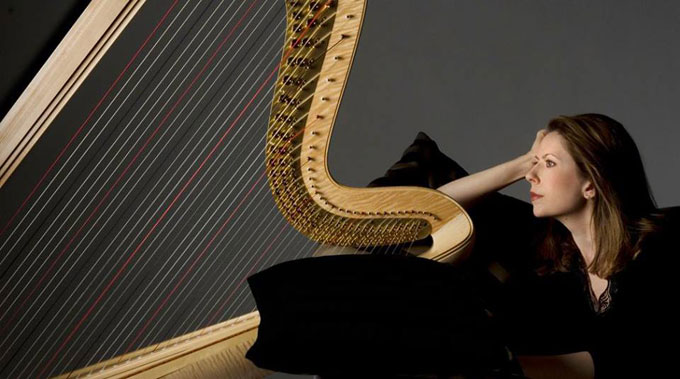Next story: Locally Produced Kung-Ku Film to Debut in Buffalo
BPO Goes All Mozart
by Jan Jezioro

The orchestra celebrates Mozart's birthday in style
The musicians of the Buffalo Philharmonic Orchestra have a long tradition of celebrating the January 27 birthday anniversary of Wolfgang Amadeus Mozart. In years past, BPO musicians held an annual birthday concert of Mozart’s chamber music at the Lancaster Opera House. In recent years, the celebration has been moved to Kleinhans, where guest conductor David Alan Miller will lead a pair of concerts this Saturday at 8pm and Sunday at 2:30pm. Miller, conductor of the Albany Symphony Orchestra since 1992, received a Grammy Award in January 2014 for his Naxos recording of John Corigliano’s “Conjurer” featuring the noted British percussionist Evelyn Glennie as soloist, with the Albany Symphony.
Harpist Yolanda Kondonassis and flutist Demarre McGill will be the guest soloists in the program’s centerpiece, the Concerto for Flute and Harp and Orchestra in C Major, K. 299, a work last programmed by the BPO in 1988, in a performance that featured Buffalo’s own Carol Wincenc as the flutist.
Yolanda Kondonassis, the first lady of the harp in the United States, has enjoyed an enviable career during the last few decades, first winning the most prestigious harp competitions worldwide, and then going on to perform with the highest profile orchestras both in this country and in Europe. She has also been one of the most prolific sponsors of new music for her instrument, recording solo works by composers such as John Williams, Lowell Liebermann, John Cage, Stephen Paulus, and Norman Dello Joio. Kondonassis has recently formed a duo with Buffalo native Jason Vieaux, her colleague at the Cleveland Institute of Music.
Flutist Demarre McGill was named principal flutist of the Dallas Symphony Orchestra in September 2013, after holding the same position with the Seattle Orchestra. Winner of the prestigious Avery Fisher Career Grant, McGill has performed in Bach’s Brandenburg Concerto No.2 on a PBS ‘Live From Lincoln Center’ broadcast with the Chamber Music Society.
Mozart composed his Concerto for Flute and Harp and Orchestra in April of 1788 for Adrien-Louis de Bonnières, Duc de Guînes, a French nobleman who had served as French ambassador, first in Berlin and later in London, from 1770 to 1776 when French aid to the American Revolution resulted in a diplomatic breach. Mozart spent six months in Paris during the spring and summer of 1788, after he had left Salzburg, his birthplace, in search of any other employment rather than continue working for the autocratic and dictatorial Count Hieronymus von Colloredo, Prince-Archbishop of Salzburg. Unable to secure an official appointment while in Paris, Mozart was left scrambling for sources of income, a very different situation than during his first visit as a seven-year old prodigy, fifteen years earlier, when he was the darling of court circles.
He was employed by de Guînes to give his daughter lessons in music composition. The daughter, Marie-Louise-Philippine, proved to be a poor student of composition, but an excellent harpist, as Mozart described her playing as “magnifique” in a letter to his father. Shades of Frederick the Great, King of Prussia, her father was also a very accomplished flute player, with Mozart describing his flute playing as “unforgettable.” Unfortunately, the Duc was also a cheapskate, as Mozart noted in a later letter of July 31 to his father: “The Duc de Guînes tried to pay me for only one lesson when I’d taught two, this plus the fact that he has had my Concerto for Flute and Harp for four months and still hasn’t paid me!” There is a story, perhaps apocryphal, that when Mozart eventually went to collect his commission, the Duc was not available, but that his housekeeper gave the composer half of the fees due. Greatly compounding Mozart’s distress during his Paris sojourn was the death of Anna Maria, his beloved mother, with whom he was particularly close, on July 3.
However, as is so often the case with Mozart, the concerto for flute and harp is a charming work, abounding in melodies and untouched by the personal problems that were troubling him. The flute and the harp are presented equally as virtuoso soloists in the lively opening movement Allegro, with the flute sometimes engaging in a dialogue with the strings. According to Alfred Einstein, one of the best Mozart biographers, the lyrical Andantino is “decorative and sensuous but not lacking in deeper emotions.” The final happy, bubbling Rondo ends like the two previous movements with both a cadenza and a coda, demonstrating why this work has continued to prove irresistible to both flute players and harpists, along, of course with classical music audiences.
The program also includes the ever popular Symphony No.38 in D major, K.504 “Prague” and the String Divertimento K. 136, a very early work by the composer that might have actually begun its life as a string quartet.
Information: www.bpo.org
blog comments powered by Disqus|
Issue Navigation> Issue Index > v14n3 (Week of Thursday, January 22) > BPO Goes All Mozart This Week's Issue • Artvoice Daily • Artvoice TV • Events Calendar • Classifieds |









 Current Issue
Current Issue